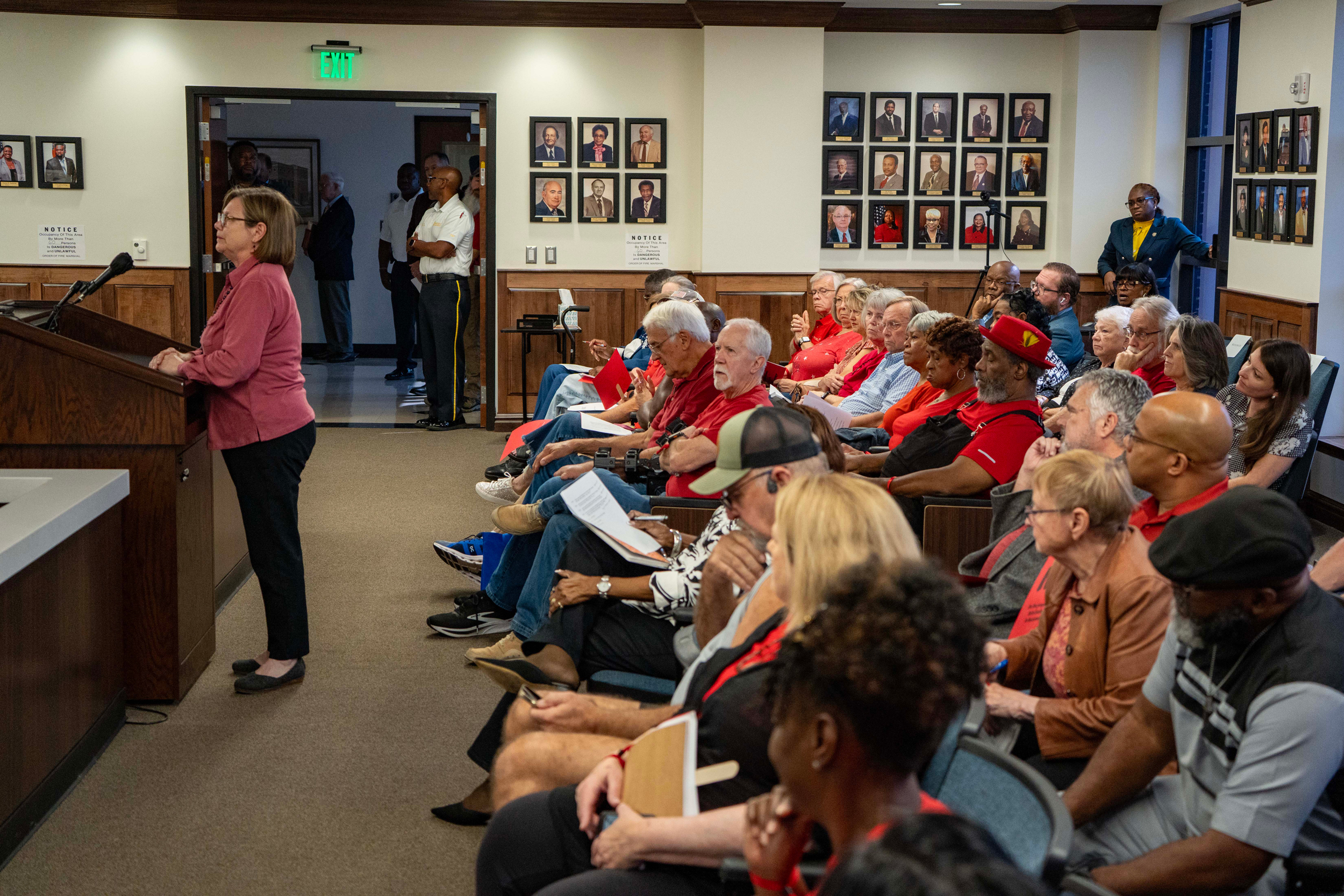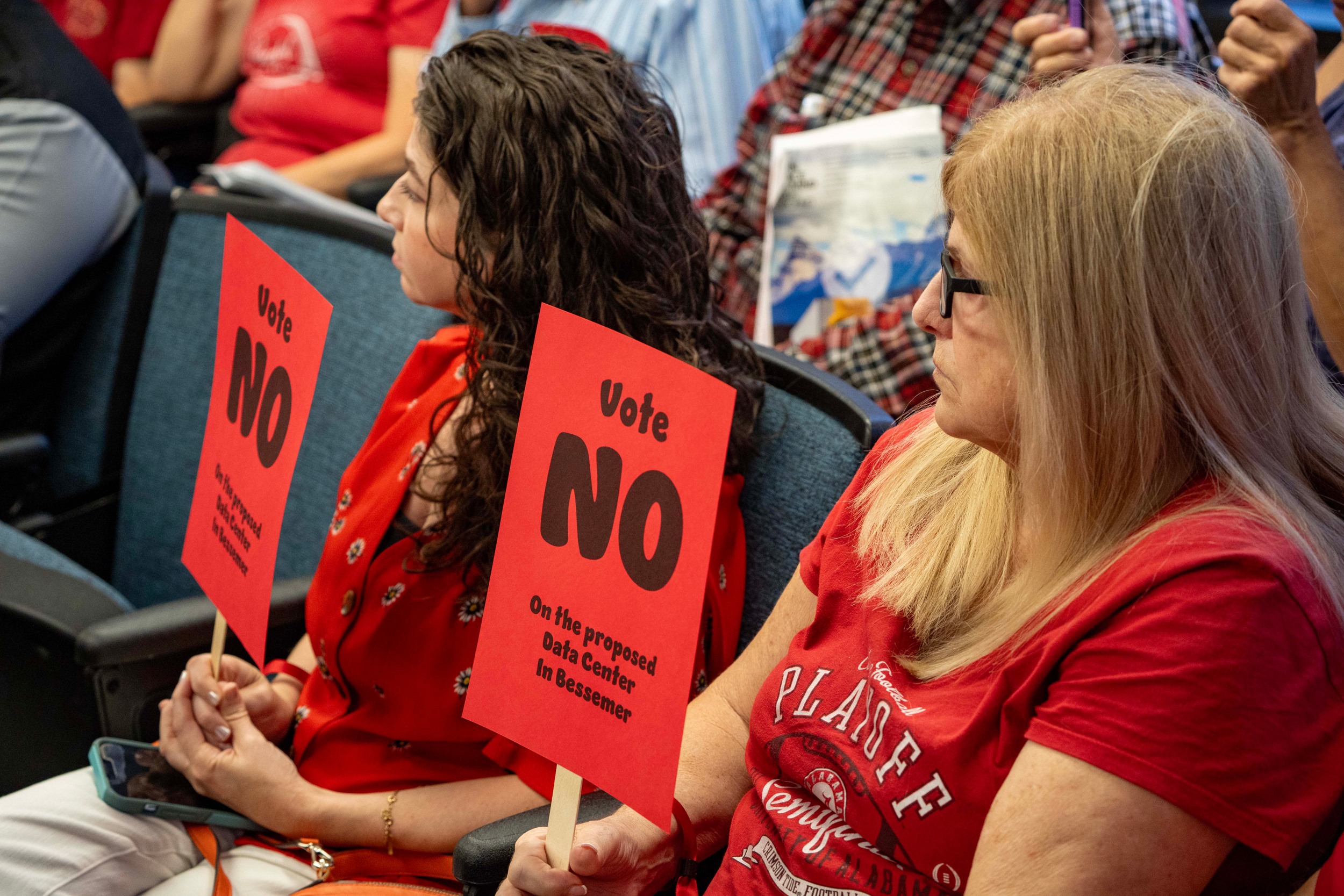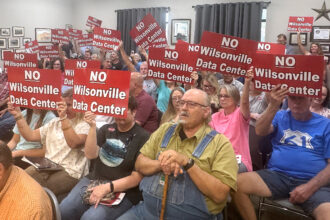BESSEMER, Ala.—Residents living near the site of a proposed 4.5 million square foot data center delight in even small victories.
Their satisfaction was apparent as they exited Bessemer’s City Council chambers, where community members wearing red in opposition to the plan had once again filled the room to capacity.
On Tuesday, City Council members voted unanimously to send a recommendation to approve rezoning and a development plan for the project back to Bessemer’s planning and zoning commission for further consideration, a move that is likely to delay a final vote on the project for weeks.
Mary Rosenboom smiled outside the council chambers Tuesday but said she knows that even with a delay, the battle is just beginning.
“Any delay is good,” Rosenboom told Inside Climate News. “For the sake of saving themselves from embarrassment, the council framed this delay as caring for the community. But in the end, this is about the almighty dollar.”
The rezoning of around 700 acres of wooded land from agricultural to light industrial would facilitate the construction of a hyperscale data center. The delay comes on the heels of a letter sent to the council, signed by environmental lawyers, community groups and impacted residents opposed to the facility’s construction, which could take up to 10 years.
The letter emphasized legal, logistical and environmental concerns around the council’s consideration of a development and rezoning plan supported by Logistic Land Investments LLC, the developer behind the proposed data center.
“We urge you to take this zoning proposal into careful consideration for the citizens of Bessemer, their neighbors, and all Alabamians. As the record stands now, there are simply too many unanswered questions for the City Council to approve this rezoning proposal,” the letter said.
In addition to residents, signatories included representatives of the Southern Environmental Law Center, Alabama Rivers Alliance, Black Warrior Riverkeeper, Center for Biological Diversity, Energy Alabama, the air pollution nonprofit GASP and the People’s Justice Council. They said the project would have serious implications for air quality, consume massive amounts of energy and water, threaten imperilled and endangered species and burden communities already impacted by outsized environmental risks.
During Tuesday’s meeting, city attorney Aaron Killings read a prepared statement saying that the council had determined that it “may be beneficial to ensure full consideration of public input and consistency with city zoning and comprehensive planning objectives” to refer the project back to Bessemer’s planning and zoning commission.

That body has twice recommended approval of the proposals. After its first recommendation, a lawsuit by residents over allegedly improper public notice led to a temporary restraining order that prevented the council from considering the matter. Tuesday’s vote, then, was the council’s reaction to the commission’s second vote to recommend approval.
After the council voted unanimously to send the issue back to the planning and zoning commission for a third round, Council President Donna Thigpen relayed a message for those in attendance.
“We’re hearing you,” she told the packed room. “Don’t think we’re not hearing you.”
Rosenboom said the $14.5 billion project will ultimately make its way back to council members.
“In my heart, I want to trust them, but in the end, I just don’t know,” she said.
Representatives for the developer did not appear to be present for Tuesday’s 9 a.m. meeting, which to Rosenboom suggested that the council had already planned its decision ahead of time. Residents have had to repeatedly adjust their schedules to pack the city’s council chambers for meeting after meeting, she said, all to ensure that they’re given the same consideration as the project’s developer.
“People have to take off work and change their schedules. We have to make sacrifices to be there,” she said. “They’re trying to wear us down.”
She said she believes that the council delayed final consideration of the proposal to ensure that all procedural boxes have been adequately checked, particularly in light of the letter from environmental lawyers and community groups, as a way of staving off any potential legal challenges down the road.
The delay, while a small victory for residents, should be seen for what it is, Rosenboom said.
“I want to see the beauty in it, but you can’t look this monster in the face and make it beautiful,” she said.
Despite the obstacles of challenging such a large project, she said she and other residents are prepared for what’s to come.
“We’re fighting. We’re going to use every tool available in our arsenal,” she said. “This developer needs to tuck their tail and run.”
About This Story
Perhaps you noticed: This story, like all the news we publish, is free to read. That’s because Inside Climate News is a 501c3 nonprofit organization. We do not charge a subscription fee, lock our news behind a paywall, or clutter our website with ads. We make our news on climate and the environment freely available to you and anyone who wants it.
That’s not all. We also share our news for free with scores of other media organizations around the country. Many of them can’t afford to do environmental journalism of their own. We’ve built bureaus from coast to coast to report local stories, collaborate with local newsrooms and co-publish articles so that this vital work is shared as widely as possible.
Two of us launched ICN in 2007. Six years later we earned a Pulitzer Prize for National Reporting, and now we run the oldest and largest dedicated climate newsroom in the nation. We tell the story in all its complexity. We hold polluters accountable. We expose environmental injustice. We debunk misinformation. We scrutinize solutions and inspire action.
Donations from readers like you fund every aspect of what we do. If you don’t already, will you support our ongoing work, our reporting on the biggest crisis facing our planet, and help us reach even more readers in more places?
Please take a moment to make a tax-deductible donation. Every one of them makes a difference.
Thank you,













